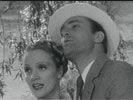Eye For Film >> Movies >> The Song Of Songs (1933) Film Review
The Song Of Songs
Reviewed by: Themroc

The title refers to the Bible’s Song Of Solomon, a poem of rhapsodic beauty and romance, which inspires Dietrich’s young German peasant girl Lily in her naïve dreams of finding everlasting love.
Following the death of her devoted and religious father, she moves to Berlin to stay with a stern, humourless aunt who runs a bookstore. However, shortly after arriving, a chance meeting with Richard Waldow, a good looking but emotionally constipated sculptor, throws her life into disarray. What follows is a schematic and somewhat predictable tale about the corruption of country innocence by the cynicism and cruelty of city life, as Lily has her heart and romantic dreams shattered before finding herself entrapped in a loveless marriage to the predatory, monocled Baron von Merzbach.

There is much to criticise about the film. The early plotting in particular, as the characters are clumsily shifted into the positions that the narrative demands, is contrived and, in places, as naïve as the film’s protagonist. In addition, much of the acting by the supporting cast, in part due to the inadequacy of the script, is wooden and unconvincing.
However, it is a tribute to director Rouben Mamoulian (who had previously directed a vivid and surprisingly effective adaptation of Dr Jeckyll and Mr Hyde) that he manages to craft moments of genuine cinematic poetry from such thin material. The picture is not only beautifully photographed and scored, but Mamoulian’s careful handling of the film’s key scenes, particularly those involving the flowering of Lily’s sexual relationship with the young sculptor, gives the film a passion and striking eroticism that is rarely in evidence in filmmaking during the restrictive years of the censorious Hays Production Code. Mamoulian’s imaginative editing and clever use of the symbolic marble statue of Lily’s naked yet pious devotion both highlight the erotic nature of the characters’ relationship with tenderness and tact, rather than simply ignoring it or subordinating it to insipid notions of chaste love and devotion.
But in spite of Mamoulian’s confident hand and occasionally inspired directorial flourishes, there is no question that the film belongs to Dietrich. Her portrayal of Lily’s journey from wide-eyed country innocent to emotionally damaged cynic is both plausible and more moving than the story’s predictable arc would appear to allow. Beyond, her figure (which the plot demands be remarked upon often) and those incredible cheekbones, she has a face that is so expressive and an apparent empathy with her character that is so natural, she is able to convey complexities in scenes that don’t appear to exist within the script.
In the early scenes, she has the vulnerability of a child, but beneath that also a quiet confidence in her small acts of rebellion that hints at her innate ability to survive. And, in spite of her shyness and embarrassment at being asked to disrobe so Waldow can sculpt her, Dietrich brings to the scene the sense of the nervous excitement that comes with discovery of the power of sexuality and of falling in love for the first time. Dietrich and Mamoulian refuse to allow the character to be simply a two–dimensional prude. This is partly because if they did, then her transformation into sultry lounge-room chanteusse would simply seem implausible, but it is also partly, I suspect, because they both understood it is precisely these contradictions in Lily’s nature as much as the malevolent outside forces which allow that transformation to take place.
It is perhaps unavoidable given the time that a story of apparently inevitable tragedy should be rescued by a trite ending. However, it is disappointing that such a conclusion should be tacked onto the film with such sloppiness. Like Thomas Hardy’s Angel Clare, Waldow realises too late what he has given up, and the film makes a strong case for saying that the damage done in the intervening period is simply irreversible. Unfortunately, it then reverses it in a heartbeat and in a manner that is both dramatically unconvincing and dismayingly patronising. Nevertheless, Song Of Songs, although a minor Dietrich picture, is certainly worth watching for the many pleasures that lurk beneath its deceptively crude surface.
Reviewed on: 10 Dec 2006


















